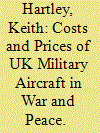|
|
|
Sort Order |
|
|
|
Items / Page
|
|
|
|
|
|
|
| Srl | Item |
| 1 |
ID:
190434


|
|
|
|
|
| Summary/Abstract |
While a growing body of research has highlighted a significant and positive relationship between negotiated peace agreements and postwar democratization, they have focused almost exclusively on a minimalist form of electoral democracy. We extend this analysis to consideration of how civil war outcomes affect egalitarian democracy, which measures the extent to which the regime incorporates (1) equal protection of rights and freedoms, (2) equal distribution of resources, and (3) equal access to power. We add V-Dem egalitarian democracy measures to the UCDP Conflict Termination dataset to determine whether civil war outcomes account for just the emergence of electoral democracy or whether they also affect the prospects for a more just and equitable society for citizens at the grassroots level. Our findings highlight the need to qualify the effect of modes of war termination on postwar democratization. Peace agreements are followed by higher levels of democratization than is the case with other civil war outcomes, but the effect on egalitarian democracy is more durable than the effect on electoral democracy.
|
|
|
|
|
|
|
|
|
|
|
|
|
|
|
|
| 2 |
ID:
190438


|
|
|
|
|
| Summary/Abstract |
Much of the literature on military aircraft unit costs is based on US data. This article adds to our knowledge by using an original data set for UK military aircraft costs, profits and prices. A distinction is made between unit costs within a generation of aircraft and between generations. Four research questions are addressed. First, is the UK aircraft industry a decreasing cost industry; second, are new entrants higher cost suppliers; third, what is the evidence on profitability in war and peace and between new entrants and original developers; fourth, what is the UK evidence on Augustine-type cost escalation and on the efficiency of aircraft procurement in war and peace? The UK aircraft industry was found to be a decreasing cost industry reflecting both scale and learning economies. Typically, new entrants were higher cost suppliers and profit rates were higher in peace-time. There was substantial Augustine cost escalation for UK combat aircraft and doubts are raised about the efficiency of military aircraft procurement.
|
|
|
|
|
|
|
|
|
|
|
|
|
|
|
|
| 3 |
ID:
190436


|
|
|
|
|
| Summary/Abstract |
Although possible asymmetries for univariate and multivariate dynamics have been the focus of interest in many areas of economic explorations, it seems that most of the research on military expenditure - economic growth nexus has tended to assume linear relationships. This paper aims to examine possible nonlinearities in military expenditure-economic growth nexus employing data for a sample of 103 countries covering the 1988-2019 period. For this purpose, Panel Smooth Transition Regression, PSTR, models are estimated not only for all countries’ sample but also for low income, middle income, and high-income countries’ subsamples to reveal possible distinct asymmetric relationships for country groups with different income levels. Empirical results for the whole sample, low income and middle income groups indicate that military expenditure not only governs the regime change, but also low and high levels of military expenditure have distinctive and rising negative effects on economic growth with dissimilar threshold effects. Moreover, empirical findings also indicate that net arms exports govern regime change for high income countries, and as net arms exports rise, the negative impacts of military expenditure on economic growth become deeper.
|
|
|
|
|
|
|
|
|
|
|
|
|
|
|
|
| 4 |
ID:
190437


|
|
|
|
|
| Summary/Abstract |
The recent economic literature concludes that geopolitical risk has significantly impacted various economic variables over the past years. This paper focuses on a new dimension and seeks to answer if the US major macroeconomic indicators affect the international geopolitical risk (GPR). Based on our knowledge, there is no such study conducted so far, and thus, we propose to fill this gap. We constructed a theoretical framework and estimated an econometric model using the Autoregressive Distributed Lag methodology and quarterly data (1973–2020). The results show a statistically significant effect of the US macroeconomic variables on the GPR. The long-run results are decisive and unique, while the short-run influences are mixed in significance levels and signs. Hence, the short-run impact may differ over time and its final impact depends on the outweighing effect between the harmful and beneficial outcomes. The findings prove that a dominant country with economic and political powers can influence the GPR. From a policy implication side, we affirm that globalization should proceed side by side with cooperation and coordination among nations to solve economic glitches. Otherwise, geopolitical risk will make the economic performance worse.
|
|
|
|
|
|
|
|
|
|
|
|
|
|
|
|
| 5 |
ID:
190432


|
|
|
|
|
| Summary/Abstract |
Why have Israel and the Palestinians failed to implement a ‘land for peace’ solution, along the lines of the Oslo Accords? This paper studies the application of strategic behavior models, in the form of games, to this question. I show that existing models of the conflict largely rely on unrealistic assumptions about what the main actors are trying to achieve. Specifically, they assume that Israel is strategically interested in withdrawing from the occupied territories pending resolvable security concerns but that it is obstructed from doing so by violent Palestinians with other objectives. I use historical analysis along with bargaining theory to shed doubt on this assumption and to argue that the persistence of conflict has been aligned with, not contrary to, the interests of the militarily powerful party, Israel. The analysis helps explain, from a strategic behavior perspective, why resolutions like the Oslo Accords, which rely on the land for peace paradigm and on self-enforcement, have failed to create peace.
|
|
|
|
|
|
|
|
|
|
|
|
|
|
|
|
| 6 |
ID:
190433


|
|
|
|
|
| Summary/Abstract |
We examine the long-term effects of civil war in former Yugoslavia on economic growth and development. To this end, we employ the synthetic control methodology, and estimate the missing counterfactual scenario for the long-run growth and development of former Yugoslav republics, in the absence of the civil war by matching their growth and development characteristics with non-Yugoslav countries at the similar stages of development. The results suggest that the civil war led to unprecedented long-run growth and development losses. In the absence of the war, per capita income levels of former Yugoslav republics would improve markedly with notable differences in the magnitude of the growth and development gains across the affected countries. The estimated effects of the civil war are robust to a large number of placebo checks, and falsification-based random permutation tests. The results show that not a single former Yugoslav republic down to the present day has achieved the level of per capita income predicted by their synthetic control groups in the years preceding the civil war. Our results show that the Yugoslav civil war appears to be a permanent institutional shock with long-lasting implications for economic growth and development.
|
|
|
|
|
|
|
|
|
|
|
|
|
|
|
|
| 7 |
ID:
190439


|
|
|
|
|
| Summary/Abstract |
This paper analyses the determinants of productivity and its evolution over time, of the main sectors that conform the Spanish defence industry. The analysis is based on the selection of factors that describe the situation of the industrial sectors. As inputs, the following are used: direct sales to the Spanish Ministry of Defence and international defence sales. From the output side the number of employees. The data is a panel for the period over 2010-2017. According to the results obtained, the sectors show a variation in productivity with a tight increasing trend of 0.4%.
|
|
|
|
|
|
|
|
|
|
|
|
|
|
|
|
|
|
|
|
|